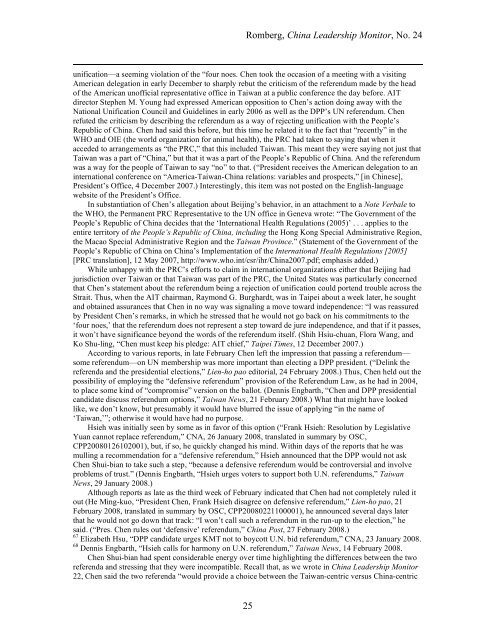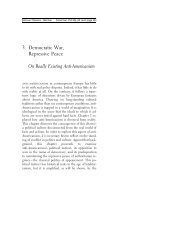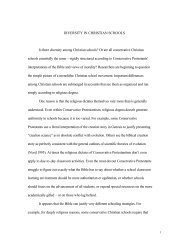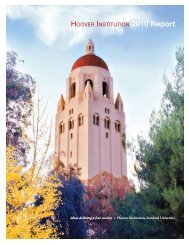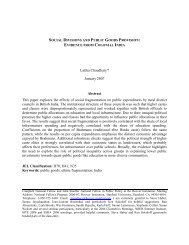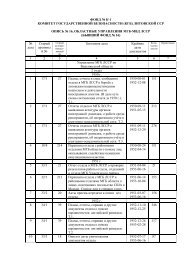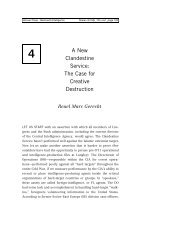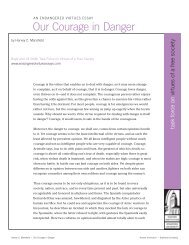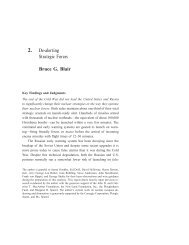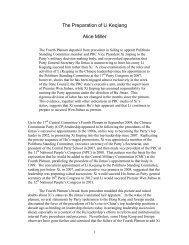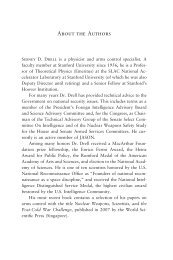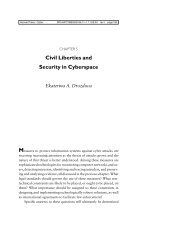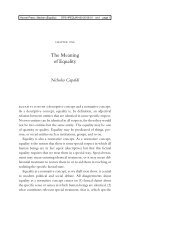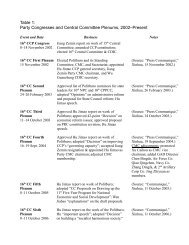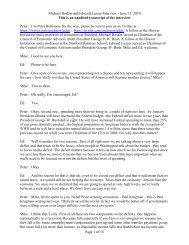Taiwan Elections: Foundation for the Future - Hoover Institution
Taiwan Elections: Foundation for the Future - Hoover Institution
Taiwan Elections: Foundation for the Future - Hoover Institution
You also want an ePaper? Increase the reach of your titles
YUMPU automatically turns print PDFs into web optimized ePapers that Google loves.
Romberg, China Leadership Monitor, No. 24<br />
unification—a seeming violation of <strong>the</strong> “four noes. Chen took <strong>the</strong> occasion of a meeting with a visiting<br />
American delegation in early December to sharply rebut <strong>the</strong> criticism of <strong>the</strong> referendum made by <strong>the</strong> head<br />
of <strong>the</strong> American unofficial representative office in <strong>Taiwan</strong> at a public conference <strong>the</strong> day be<strong>for</strong>e. AIT<br />
director Stephen M. Young had expressed American opposition to Chen’s action doing away with <strong>the</strong><br />
National Unification Council and Guidelines in early 2006 as well as <strong>the</strong> DPP’s UN referendum. Chen<br />
refuted <strong>the</strong> criticism by describing <strong>the</strong> referendum as a way of rejecting unification with <strong>the</strong> People’s<br />
Republic of China. Chen had said this be<strong>for</strong>e, but this time he related it to <strong>the</strong> fact that “recently” in <strong>the</strong><br />
WHO and OIE (<strong>the</strong> world organization <strong>for</strong> animal health), <strong>the</strong> PRC had taken to saying that when it<br />
acceded to arrangements as “<strong>the</strong> PRC,” that this included <strong>Taiwan</strong>. This meant <strong>the</strong>y were saying not just that<br />
<strong>Taiwan</strong> was a part of “China,” but that it was a part of <strong>the</strong> People’s Republic of China. And <strong>the</strong> referendum<br />
was a way <strong>for</strong> <strong>the</strong> people of <strong>Taiwan</strong> to say “no” to that. (“President receives <strong>the</strong> American delegation to an<br />
international conference on “America-<strong>Taiwan</strong>-China relations: variables and prospects,” [in Chinese],<br />
President’s Office, 4 December 2007.) Interestingly, this item was not posted on <strong>the</strong> English-language<br />
website of <strong>the</strong> President’s Office.<br />
In substantiation of Chen’s allegation about Beijing’s behavior, in an attachment to a Note Verbale to<br />
<strong>the</strong> WHO, <strong>the</strong> Permanent PRC Representative to <strong>the</strong> UN office in Geneva wrote: “The Government of <strong>the</strong><br />
People’s Republic of China decides that <strong>the</strong> ‘International Health Regulations (2005)’ . . . applies to <strong>the</strong><br />
entire territory of <strong>the</strong> People’s Republic of China, including <strong>the</strong> Hong Kong Special Administrative Region,<br />
<strong>the</strong> Macao Special Administrative Region and <strong>the</strong> <strong>Taiwan</strong> Province.” (Statement of <strong>the</strong> Government of <strong>the</strong><br />
People’s Republic of China on China’s Implementation of <strong>the</strong> International Health Regulations [2005]<br />
[PRC translation], 12 May 2007, http://www.who.int/csr/ihr/China2007.pdf; emphasis added.)<br />
While unhappy with <strong>the</strong> PRC’s ef<strong>for</strong>ts to claim in international organizations ei<strong>the</strong>r that Beijing had<br />
jurisdiction over <strong>Taiwan</strong> or that <strong>Taiwan</strong> was part of <strong>the</strong> PRC, <strong>the</strong> United States was particularly concerned<br />
that Chen’s statement about <strong>the</strong> referendum being a rejection of unification could portend trouble across <strong>the</strong><br />
Strait. Thus, when <strong>the</strong> AIT chairman, Raymond G. Burghardt, was in Taipei about a week later, he sought<br />
and obtained assurances that Chen in no way was signaling a move toward independence: “I was reassured<br />
by President Chen’s remarks, in which he stressed that he would not go back on his commitments to <strong>the</strong><br />
‘four noes,’ that <strong>the</strong> referendum does not represent a step toward de jure independence, and that if it passes,<br />
it won’t have significance beyond <strong>the</strong> words of <strong>the</strong> referendum itself. (Shih Hsiu-chuan, Flora Wang, and<br />
Ko Shu-ling, “Chen must keep his pledge: AIT chief,” Taipei Times, 12 December 2007.)<br />
According to various reports, in late February Chen left <strong>the</strong> impression that passing a referendum—<br />
some referendum—on UN membership was more important than electing a DPP president. (“Delink <strong>the</strong><br />
referenda and <strong>the</strong> presidential elections,” Lien-ho pao editorial, 24 February 2008.) Thus, Chen held out <strong>the</strong><br />
possibility of employing <strong>the</strong> “defensive referendum” provision of <strong>the</strong> Referendum Law, as he had in 2004,<br />
to place some kind of “compromise” version on <strong>the</strong> ballot. (Dennis Engbarth, “Chen and DPP presidential<br />
candidate discuss referendum options,” <strong>Taiwan</strong> News, 21 February 2008.) What that might have looked<br />
like, we don’t know, but presumably it would have blurred <strong>the</strong> issue of applying “in <strong>the</strong> name of<br />
‘<strong>Taiwan</strong>,’”; o<strong>the</strong>rwise it would have had no purpose.<br />
Hsieh was initially seen by some as in favor of this option (“Frank Hsieh: Resolution by Legislative<br />
Yuan cannot replace referendum,” CNA, 26 January 2008, translated in summary by OSC,<br />
CPP20080126102001), but, if so, he quickly changed his mind. Within days of <strong>the</strong> reports that he was<br />
mulling a recommendation <strong>for</strong> a “defensive referendum,” Hsieh announced that <strong>the</strong> DPP would not ask<br />
Chen Shui-bian to take such a step, “because a defensive referendum would be controversial and involve<br />
problems of trust.” (Dennis Engbarth, “Hsieh urges voters to support both U.N. referendums,” <strong>Taiwan</strong><br />
News, 29 January 2008.)<br />
Although reports as late as <strong>the</strong> third week of February indicated that Chen had not completely ruled it<br />
out (He Ming-kuo, “President Chen, Frank Hsieh disagree on defensive referendum,” Lien-ho pao, 21<br />
February 2008, translated in summary by OSC, CPP20080221100001), he announced several days later<br />
that he would not go down that track: “I won’t call such a referendum in <strong>the</strong> run-up to <strong>the</strong> election,” he<br />
said. (“Pres. Chen rules out ‘defensive’ referendum,” China Post, 27 February 2008.)<br />
67 Elizabeth Hsu, “DPP candidate urges KMT not to boycott U.N. bid referendum,” CNA, 23 January 2008.<br />
68 Dennis Engbarth, “Hsieh calls <strong>for</strong> harmony on U.N. referendum,” <strong>Taiwan</strong> News, 14 February 2008.<br />
Chen Shui-bian had spent considerable energy over time highlighting <strong>the</strong> differences between <strong>the</strong> two<br />
referenda and stressing that <strong>the</strong>y were incompatible. Recall that, as we wrote in China Leadership Monitor<br />
22, Chen said <strong>the</strong> two referenda “would provide a choice between <strong>the</strong> <strong>Taiwan</strong>-centric versus China-centric<br />
25


